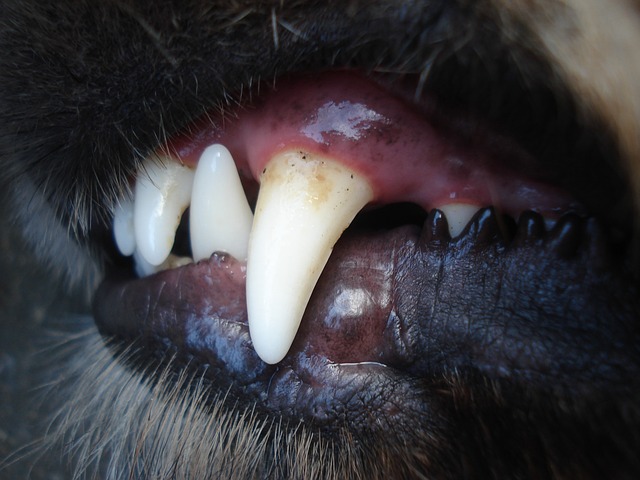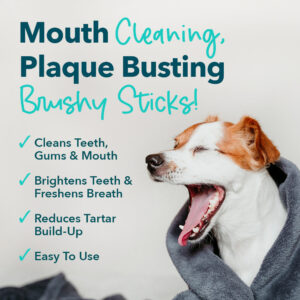It’s a sad fact that more than 80% of dogs have periodontal disease (problems with the teeth and gums) by the time they’re 3 years old. Most of those dogs will show no signs of pain or problems, either, unless you really know what to look for. What’s the big deal, anyway? Actually, failing to care for your dog’s teeth and gums can cause a wide variety of health problems that can affect more than just his mouth. Let’s look at some of the problems dogs can have when you don’t care for their teeth, then we’ll talk about the easiest way to maintain his dental health.

#1 – Dental disease promotes inflammation throughout the body
If you neglect to care for your dog’s teeth, bacteria can grow unchecked in their mouth and under their gums. This bacteria triggers the immune system to create inflammation, which can be extremely painful for your dog. It can even affect other organs in his body. Dr. Chad Lothamer, an assistant professor of dentistry and oral surgery at the Veterinary Teaching Hospital at Colorado State University, told PetMD:
“In fact, the majority of tissue destruction associated with dental infections is caused by products of the immune system and not by degradation products from the bacteria themselves. This can lead to local tissue loss, pain, and infection of the surrounding tissues. Infections in and around the teeth do cause increases in inflammatory mediators and can cause bacteremia (a state in which bacteria appears in the blood), which likely does cause damage to distant parts of the body or distant infections.”

#2 – Dental disease increases the risk for heart disease
The extra bacteria floating around your dog’s body is likely the reason that dogs with stage three periodontal disease are six times more likely than other dogs to suffer from cardiovascular problems such as endocarditis. In fact, cultured bacteria from damaged heart valves match the bacteria found in the mouth of a dog suffering from periodontal disease.
#3 – Diabetes gets worse with dental disease
Diabetes and dental disease go hand in hand and make each other worse. Sometimes dental disease can even lead to diabetes. If your dog already has dental problems, diabetes will make it worse, and it will be more difficult to treat your dog’s diabetes if he is also battling dental disease.

#4 – Periodontal disease can cause sensitivity, pain, and even a broken jaw
Dogs are adept at hiding their pain. If you’ve ever needed a root canal or a tooth extraction, you likely know how much a bad tooth can hurt. Your dog may be in pain and not even be showing any symptoms. Periodontal infections can become so severe that it eats away at your dog’s jaw bone, eventually causing it to break with little effort. That’s a tragic outcome for a disease with a relatively simple solution.
The easiest way to maintain your dog’s dental health
Happy, Healthy™ Brushy Sticks Dental Dog Treats – Dental Chews for Dogs – 30 Sticks are a tasty gluten-free way to help maintain your dog’s dental health. The sticks fight plaque, control tartar, and freshen your dog’s breath. These sticks are low-calorie, contain no artificial colors, and were formulated by veterinarians to help care for your dog’s teeth in a way that he will actually enjoy instead of running from the toothbrush every time you pull it out! The sticks are easy to digest and come in two different sizes. On top of all those benefits, each purchase feeds 7 shelter dogs! For less than 50¢ a day, you can give your pup the best tools to prevent dental disease. Do you have more questions? Read, The Top 7 Questions Around Doggy Dental Health and have all your questions answered!
(Special offer! Only $12.99 for a limited time, as of when this article was updated on Sept. 20th, 2021 at 11:45am.)
These statements have not been evaluated by the Food and Drug Administration. This product is not intended to diagnose, treat, cure, or prevent any disease. The information on this website is not intended to replace a one-on-one relationship with a qualified healthcare professional.
(H/T: WebMD Pets, PetMD)


 Toledo, United States.
Toledo, United States.